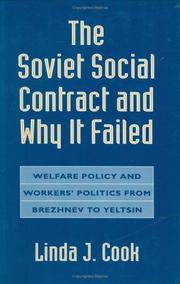Check nearby libraries
Buy this book

As their woefully backward economy continues to crumble, much of the Soviet population remains indifferent, if not downright hostile, to the idea of reform. This phenomenon, so different from the Solidarity movement in Poland or the velvet revolution in Czechoslovakia, has been explained in terms of a "social contract" - a tacit agreement between the post Stalin regime and the working class whereby the state provided economic and social security in return for the workers' political compliance.
This book is the first critical assessment of the likelihood and implications of such a contract. Linda Cook pursues the idea from Brezhnev's day to our own, and considers the constraining effect it may have had on Gorbachev's attempts to liberalize the Soviet economy.
.
In case studies on job security, retail price stability, and social service subsidies, Cook identifies points at which leaders had to make critical decisions - to commit more resources or to abandon other policies at significant cost - in order to maintain the contract. The pattern that emerges attests to the validity of the social contract thesis for the Brezhnev period.
At the same time, Cook's analysis points to several important factors, such as the uneven distribution of benefits, that help explain why labor unrest and activism have varied dramatically from sector to sector in recent years. Ultimately, these case studies reveal, particularly for the Gorbachev period, deep conflicts between the old contract and the requisites of economic reform.
- Cook extends her analysis into the Yeltsin period to show how the democratizing state dealt weakly with labor's demands, seeking to stabilize labor relations with an inappropriate corporate structure. In the end, mobilized labor contributed greatly to the pressures that undermined Gorbachev's regime, and remained an obstacle to economic reform through the early months of Yeltsin's Russia.
Check nearby libraries
Buy this book

Previews available in: English
Showing 1 featured edition. View all 1 editions?
| Edition | Availability |
|---|---|
|
1
The Soviet social contract and why it failed: welfare policy and workers' politics from Brezhnev to Yeltsin
1993, Harvard University Press
in English
0674828003 9780674828001
|
aaaa
Libraries near you:
WorldCat
|
Book Details
Edition Notes
Includes bibliographical references (p. [219]-263) and index.
Classifications
The Physical Object
ID Numbers
Community Reviews (0)
Feedback?History
- Created April 1, 2008
- 11 revisions
Wikipedia citation
×CloseCopy and paste this code into your Wikipedia page. Need help?
| July 18, 2024 | Edited by MARC Bot | import existing book |
| December 19, 2023 | Edited by ImportBot | import existing book |
| November 16, 2020 | Edited by MARC Bot | import existing book |
| October 7, 2020 | Edited by ImportBot | import existing book |
| April 1, 2008 | Created by an anonymous user | Imported from Scriblio MARC record |












